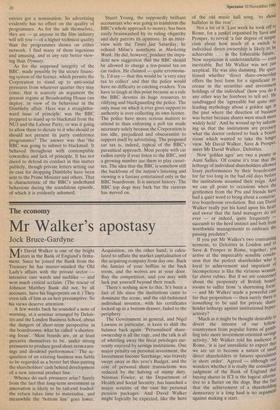The economy
Mr Walker's apostasy
Jock Bruce-Gardyne
MrDavid Walker is one of the bright stars in the Bank of England's firma- ment. Since he joined the Bank from the Treasury he has master-minded the Old Lady's affairs with the private sector — intensive care wards and suchlike — and won much critical acclaim. (The rescue of Johnson Matthey Bank did not, by all accounts, have his fingerprints on it.) They even talk of him as an heir presumptive. So his views deserve attention.
A few weeks back he sounded a note of warning, at a seminar arranged by Debit- tes and the London Business School, about the dangers of short-term perspective in the boardrooms: what he called 'a shorten- ing focus'. 'Most boards are, or at least perceive themselves to be, under strong pressures to produce good short-term earn- ings and dividend performance.' The ac- quisition of an existing business was liable to be regarded as a better bet than putting the shareholders' cash behind development of a new internal product line: Whence do such pressures arise? Surely from the fact that long-term investment in innovation is likely to be tail-end loaded: the return takes time to materialise, and meanwhile the 'bottom line' goes lower. Acquisition, on the other hand, is calcu- lated to inflate the market capitalisation of the acquiring company from day one. Back the fancies of your boffins in the back room, and the wolves are at your door. Buy the competition, and you may with luck put yourself beyond their reach.
There's nothing new to this. It's been a fact of life since the institutions came to dominate the scene, and the old-fashioned individual investor, with his certificates locked up in a bottom drawer, faded to the periphery.
The Government in general, and Nigel Lawson in particular, is keen to shift the balance back again. 'Personalised' share- ownership is all the rage, and the talk is all of whittling away the fiscal privileges cur- rently enjoyed by savings institutions. One major penalty on personal investment, the Investment Income Surcharge, was bravely swept away in this year's Budget, and the cost of personal share transactions was reduced by the halving of stamp duty. Norman Fowler, at the Department of Health and Social Security, has launched a major scrutiny of the case for personal pension packages. And David Walker might logically be expected, like the hero of the old music hall song, `to shout hullaloo in the rear'.
Not a bit of it. Last week he took off to Rome, for a junket organised by Save and
Prosper, to reveal 'a fair degree of scepti- cism about how much of a switch to individual direct ownership is likely to be, achievable . . . in the forseeable future.
Now scepticism is understandable — even inevitable. But Mr Walker was not just
sceptical. He was also damning. He ques-
tioned whether 'direct share-ownershiP offers the best form for a significant in-
crease in the securities and investment
holdings of the individual' (how you do it any other way he forebore to tell us). He sandbagged the 'agreeable but quite mis•
leading mythology about a golden age irt the past where the direction of business
was better because shares were much more widely held'. And he wound up by inform' ing us that the institutions are preciselY
what the doctor ordered to back a board' room which wanted to take the longer view. Mr David Walker, Save & Prosper, meet Mr David Walker, Deloittes.
Now 'golden ages' are two a penny as Aunt Sallies. Of course it's true that the lethargy of individual shareholders allowed lousy performances by their boardrooms for far too long in the bad old days before the institutions assumed their reign. And we can all point to occasions when the gentlemen from the Pru and friends have
had a quiet word to bring about a construc- tive boardroom revolution. But can David Walker really put his hand upon his heart and swear that the fund managers do not ever — or indeed, quite frequently succumb to the herd instinct and bolt from worthwhile managements to embrace the passing predator?
If you put Mr Walker's two contrasting sermons, to Deloittes in London and to
Save & Prosper in Rome, together, Yon arrive at the impeccably sensible conclu- sion that the perfect shareholder who is loyal to achievement and impatient ef incompetence is like the virtuous woman, far above rubies. But if we are concerno about the propensity of British board', rooms to suffer from 'a shortening focus — and Mr Walker made a powerful case for that proposition — then surely there is something to be said for private share" holder lethargy against institutional hyPer" activity?
'Much as it might be thought desirable to divert the interest of our fellow'
countrymen from popular forms of garnb- ling into more investment-oriented savings activity,' Mr Walker told his audience i° Rome, 'it is just unrealistic to expect tha,t, we are set to become a nation of small direct shareholders or futures speculators in short order'. Agreed — although one wonders whether it is really the considered judgment of the Bank of England that buying shares in ICI is the logical alterno" tive to a flutter on the dogs. But the fact that the achievement of a shareholding democracy is a long haul is no argument against making a start.














































 Previous page
Previous page